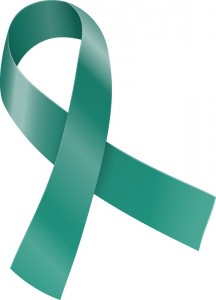Last updated on August 29th, 2017 at 10:36 am
 Ovarian cancer is the 5th most common cancer in women in the UK with about 7,300 new cases diagnosed each year, but there is little awareness of ovarian cancer and its symptoms. In fact only 3% of women are able to name one symptom of ovarian cancer, meaning that ovarian cancer has the lowest survival rate of all female cancers.
Ovarian cancer is the 5th most common cancer in women in the UK with about 7,300 new cases diagnosed each year, but there is little awareness of ovarian cancer and its symptoms. In fact only 3% of women are able to name one symptom of ovarian cancer, meaning that ovarian cancer has the lowest survival rate of all female cancers.
Ovarian cancer is particularly difficult to diagnose, yet early diagnosis is crucial and World Ovarian Cancer Day aims to raise awareness of this disease.
BEAT ovarian cancer
Ovacome launched the BEAT campaign in ovarian cancer awareness month 2010, with the centre piece of that campaign being an easy to remember acronym:
• B for bloating that is persistent and doesn’t come and go
• E for eating less and feeling fuller
• A for abdominal pain
• T for telling your GP
The key is that the symptoms will occur almost every day and not go away.
The following three symptoms are more frequent in women diagnosed with ovarian cancer.
- Persistent pelvic and abdominal pain
- Increased abdominal size/persistent bloating – not bloating that comes and goes
- Difficulty eating and feeling full quickly
Risk Factors
According to Cancer Research UK, 21% of ovarian cancer cases each year in the UK are linked to major lifestyle and other risk factors although the exact causes of ovarian cancer are not known.
Hormonal factors – starting periods at a young age, having a later menopause, taking hormone replacement therapy (HRT) (the risk decreases after stopping taking it).
Physical factors – height, endometriosis, ovarian cysts
Lifestyle factors – smoking, weight, diet
Family history – if your mother or sister has had ovarian cancer, this slightly increases your risk of developing it. But the risk is still low – about 1 in 20 (5%)
Inherited risk – a small number of ovarian cancers, about 1 in 10 (10%), are thought to be due to an inherited altered gene (genetic mutation)
Seek help
If you think that you may have a problem don’t wait, you should speak to your GP as soon as possible, and be persistent. If you feel that your concerns are not being taken seriously then you are entitled to seek advice from a different GP.
Your GP will be fully alive to the implications of your symptoms and aware of the importance of an early diagnosis.
How can we help?
Here at Graysons we recognise the devastating, and in some cases fatal, effect that a delayed diagnosis of cancer can have.
We understand the importance of compensation to you as it can greatly improve quality of life for you and your family and provide the care and security that is needed.
If you would like to talk to a member of our specialist team then please contact us for a confidential and free discussion today.
